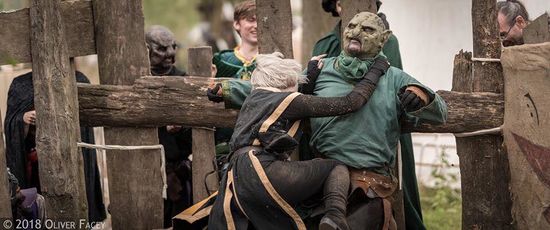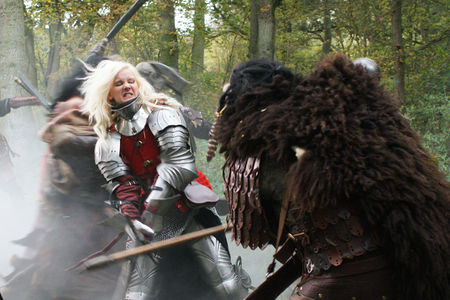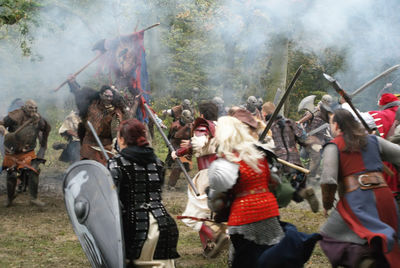Event safety
Fighting safely
- You must ensure your weapon has been checked by the weapon checking team at each event before you use it
- You must pull all of your blows so that they land with virtually no force
- You must avoid hitting the groin, neck or head
- You must avoid hitting the breasts where there is an alternative target
- You must not strike another character with the pommel or hilt of your weapon
- You must not thrust with any weapon unless it is a thrust-safe polearm
- You must not throw a weapon unless it is a throwing weapon
- You must use the specified grip for a two-handed weapon
- You must drop a flail if becomes entangled in your opponents weapon or costume
- You must not attempt to parry an arrow or bolt with a weapon
- You must not grab or trap an opponent’s weapon when they are wielding it
- You must follow the bow-safety guidelines if you use a bow or crossbow
- You must not partake in combat if you are drunk
- You must not take camping knives on quests, skirmishes or battles under any circumstance.
It is essential that you know how to fight as safely as possible using the practices common to most British live roleplaying events. If you are new to live roleplaying then please speak to a member of our GOD crew and they will arrange a suitable demonstration for you so that you can be confident that you are following all the rules:
Every weapon must be checked by a member of our weapon check team before it is used at each event you attend. You must take everything you plan to use at the event to weapon check before you use them in combat.
When you use a weapon, you must pull the blow so that it lands with negligible force. Your opponent should feel a light touch and nothing more. You must avoid hitting the head, neck or groin and you should avoid aiming at the breasts where there is a viable alternative target. If you accidentally hit an opponent in the head during battle, you should give a quick OOC apology, just as you would with any other slip-up on the battlefield. You cannot fight safely if you are drunk; you must follow the non-contact rules if a fight starts near you.
You must use a weapon in the appropriate manner. You must not strike another character with the pommel or hilt of your weapon. You must not grab or trap an opponent’s weapon when they are wielding it. You cannot thrust with a weapon unless you know it has been passed as a thrust-safe pole-arm. You cannot throw a weapon unless you know it has been passed as a throwing weapon. If you are using a bow then you must follow all the bow safety guidelines. If you are using a flail then you must drop the weapon immediately if it becomes entangled in your opponents weapon or costume. If you are using a great weapon, polearm, pike, or one handed spear then you must follow the listed rules for gripping the weapon at all times.
These rules exist to reduce the dangers inherent in combat at a live roleplaying event to an acceptable minimum, but they do not constitute a guarantee of safety. Our safety record is excellent, but by choosing to attend an Empire event, you agree to accept the risks inherent in taking part in a full contact sport.
Players may carry camping knives or similar at the event, but you must not take them with you when going on a skirmish, quest or battle.
Weapon checking
- All your weapons must be checked at every event
You must take all weapons, bows, crossbows, shields, and projectiles (arrows and bolts) that you have brought to an event to a weapon checker to have them checked against our weapon checking guidelines. These items must be checked at every event you attend. If a weapon checker does not approve your equipment for use then you will usually be asked to put it in your tent or your car. If you are not satisfied with the decision then you may request a second opinion from our head weapon checker. The decision of the head weapon checker is final.
If a weapon checker approves an item then they will attach a coloured elastic band to the item. We change the colour of the elastic bands for each event. You must not use any item for melee purposes unless you know it has been approved for that use.
You can carry items such as a walking stick, wooden staff, or banner but they must never be used in melee, so they do not need checking with the weapon checkers. We do not allow anyone to have metal weapons at events except for display or sale purposes, so you may not carry one without our prior approval for each event.
Grappling, Body Contact and Shields
- You must not grapple or make bodily contact while fighting
- You may hook shields with an axe but may not grab shields or weapons with your hands
- You may push with a shield but you may not shield barge
You must try to avoid body contact with other players during combat. You must not grapple or trip another player.
If there is a referee present before a small fight and both participants wish to grapple or use body contact, then they may let the ref know that they would like to do so. If the ref is satisfied that both participants are happy to do so, and that the area is safe, then they may give permission to grapple. The referee will not give permission to grapple if they are not satisfied that both participants are keen to do so and that the area is safe. You may not use grappling or body contact on the quests, skirmishes, or battles under any circumstances. You may not use grappling or body contact when you are inebriated.
You may hook a shield with an axe or similar hooked weapon, to pull it out of the way. You should be aware that some LRP axes are specifically designed and built to support this, the axe head is heavily reinforced with leather to allow it to withstand the force. If your weapon is not designed for it, you will break the weapon by doing this.
You may push with a shield, if you are moving at a slow walking pace or less but you must not shield-barge, you cannot run into another player using a shield or other similar item. You may not use a shield as a weapon to strike another player.
Armour
- Metal armour must be of a grade where it will not tear in use revealing sharp edges.
- Metal armour must have its edges rounded off in such a way there are no burs or snags which could damage props or players
- There must be suitable straps and attachments so armour does not come loose
- There must not be any protruding sharp decoration such as spikes that could damage weapons or people
Any suit of armour that you use at an event must not have sharp protruding edges. If you are in any doubt about the safety of your armour then you should have it examined by a weapon checker.
Battle Safety
- Our rules reduce the risks associated with combat in Empire, but they do not eliminate them
- You must follow all safety guidance given to you by our referees or other members of crew
- If you are at elevated risk from strenuous physical activity then follow any medical advice you have been given
Our skirmishes and battles are a contact sport and our rules serve to mitigate the risks, but cannot eliminate them. Participants who take the battlefield are exposed to a number of physical risks. These risks include the potential for heavy blows, physical crushes from other participants, accidental falls, and the trips and hazards of uneven ground. While our rules state all blows must be pulled, larp combat is unpredictable - and at Empire it happens on outdoor terrain, in all weathers.
It is the responsibility of everyone taking part in a battle to consider their own safety and that of the participants around them. All participants in battles should adhere to the instructions of referees and other members of crew, who have your safety and enjoyment as their primary consideration. You can practice good "self-care" by being aware of the trip hazards on the battlefield and preparing for them by wearing sensible supportive footwear; by ensuring you wear suncream if needed; and by bringing enough water to keep you hydrated throughout the battle.
If you consider yourself to be at an elevated risk of serious injury from these activities, then we ask that you take that into consideration when deciding whether to fight in battles. If you are recovering from an OC injury, are pregnant, or have any health issues that mean taking part in contact sports would put you at additional risk, then you may wish to consider seeking medical advice before participating. If a medical professional has advised you to avoid strenuous physical activity - for example, if you have an ongoing health condition that means you are at risk of permanent or even fatal injury if you participate in combat - then you should not participate in fighting.
Non-Contact
- You must not touch or physically attack anyone with their hand in the air
- You can put your hand in the air to indicate that no one should touch you
- If you do this, your character is reduced to 0 hits and is now dying
- Profound Decisions do not guarantee that you will not be hit
You may have health reasons that mean you wish to avoid becoming involved in a melee or that you cannot follow the normal rules for combat. If this is the case you may put your hand in the air to indicate that you do not wish any player to make physical contact with you. This is called being non‑contact and, while its use is uncommon at events, it is important that you understand the rules so that you can ensure the safety and well-being of other players.
If a fight starts near you then you can put your hand as high in the air as you can and keep it there, to indicate that you are non‑contact. If you indicate that you are non-contact, then you immediately lose all your global hits and start dying. You may move yourself out of the immediate melee before lying down or leaning against a tree or similar or may remain standing with your hand clearly raised. You may cease being non-contact at any point by putting your hand down, but you should not do this if you would become involved in the same melee.
It is up to the individual when or if they choose to go non-contact. There is no requirement at all to go non-contact at the start of a fight, or because a fight has happened near you. It is perfectly acceptable to move away from a melee while remaining in-character and mobile and only become non-contact if a character moves to attack you.
If you see any player indicate that they are non-contact then you must not hit them with a melee weapon, fire a bow or crossbow at them, or touch them. The player is still IC and you may roleplay with them normally but you may not hit or touch them while they are non‑contact.
It is important to note that nobody can guarantee that you will not be hit while you have indicated that you are non-contact. A live-roleplaying melee is a deeply confusing experience and mistakes can happen. If you have health reasons that make it critical that you are not hit with a latex weapon then you may need to avoid combat entirely and you must decide whether the event is safe for you to attend at all.
General safety
- Health and safety is everyone’s responsibility
- Do not fight near fires or tents
Health and safety is everyone’s responsibility at an event. Be aware of any potential hazards, and if a fight begins then move away from tents, guy ropes, and other hazards such as open fires or braziers, or camp furniture. It is not enough to be aware of such dangers when fighting; you must actively move away from such dangers to ensure that other participants in the fight are not at risk.
If your character has fallen over in a fight then you should crawl out of the way of the combat. You must make sure that anyone who has fallen over has room to move away.
The nature of an event is such that trip hazards such as uneven ground, tree roots, guy ropes, and tent pegs are unavoidable. Given the poor lighting conditions that prevail at night, one of the most important safety precautions you can take is to ensure that you wear footwear that combines good grip with firm ankle support.
Safety Calls
- There are two safety calls FIRST AID and TIME FREEZE
Empire uses two safety calls to help keep fights as safe as possible. These are fully described on the calls page.


